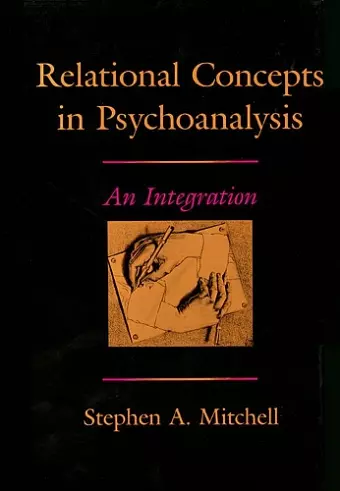Relational Concepts in Psychoanalysis
An Integration
Format:Hardback
Publisher:Harvard University Press
Published:15th Dec '88
Currently unavailable, and unfortunately no date known when it will be back

There are more psychoanalytic theories today than anyone knows what to do with, and the heterogeneity and complexity of the entire body of psychoanalytic though have become staggering. In Relational Concepts in Psychoanalysis, Stephen A. Mitchell weaves strands from the principal relational-model traditions (interpersonal psychoanalysis, British school object-relations theories, self psychology, and existential psychoanalysis) into a comprehensive approach to many of the knottiest problems and controversies in theoretical and clinical psychoanalysis.
Mitchell’s earlier book, Object Relations in Psychoanalytic Theory, co-authored with Jay Greenberg, set the stage for this current integration by providing a broad comparative analysis of important thinking on the nature of human relationships. In that classic study Greenberg and Mitchell distinguished between two basic paradigms: the drive model, in which relations with others are generated and shaped by the need for drive gratifications, and various relational models, in which relations themselves are taken as primary and irreducible. In Relational Concepts in Psychoanalysis, Mitchell argues that the drive model has since outlived its usefulness. The relational model, on the other hand, has been developed piecemeal by different authors who rarely acknowledge and explore the commonality of their assumptions or the rich complementarity of their perspectives.
In this bold effort at integrative theorizing, Mitchell draws together major lines of relational-model traditions into a unified framework for psychoanalytic thought, more economical than the anachronistic drive model and more inclusive than any of the singular relational approaches to the core significance of sexuality, the impact of early experience, the relation of the past to the present, the interpenetration of illusion and actuality, the centrality of the will, the repetition of painful experience, the nature of analytic situation, and the process of analytic change. As such, his book will be required reading for psychoanalytic scholars, practitioners, candidates in psychoanalysis, and students in the field.
Readers will find Mitchell to be a persuasive advocate for the centrality of relational thinking in psychoanalytic theory and clinical practice… Thought-provoking… As an added bonus, Mitchell writes very well, and his use of metaphor and wit make this book a pleasure to read. -- Saul E. Rosenberg, Ph.D. * American Journal of Psychiatry *
This is a marvellous book. Mitchell argues that over the past few decades psychoanalysis has undergone a paradigm shift. The change is nothing short of a revolution in thought which radically alters our understanding of the mind and human relationships… Mitchell is a persuasive writer who skillfully draws together the central ideas from object relations theory, interpersonal psychoanalysis and the self-psychologies. He argues that despite their many differences these ‘newer’ traditions have one central theme in common—they all stress the central importance of personal relationships and human interaction. In this new paradigm the focus of psychoanalytic study shifts away from the vicissitudes of the instincts to persons in their interactions with others… The book is scholarly and informative, but yet it is readable, and enjoyably so. Mitchell does a wonderful job in bringing together the relational concepts embedded in the work of Bowlby, Klein, Winnicott, Fairbairn, Kohut, and others. Brought together in this way, the case against Freud’s drive theory seems impressively self-evident… This is an excellent book which brings together the relational concepts that now characterise psychotherapy. This is the leading edge of psychoanalysis, and Mitchell’s work certainly helps it to advance. -- C. R. Whyte * British Journal of Psychiatry *
Brilliant… The gradual unfolding of Mitchell’s new theory is accomplished through a dazzling series of thoughtful and penetrating critiques and integrations of psychoanalytic theorizing past and present. Mitchell is extraordinarily well read in psychoanalytic theory, and he has a wide grasp of philosophy, political theory, and literature as well. He writes with clarity and wit, making a long, largely theoretical book as easy to read as any. His text will be an important source of useful ideas and criticism for the continuing development of psychoanalytic theory. The opportunity to share in his wide and searching understanding should not be missed by anyone interested in the field. -- Robert L. Hatcher, Ph.D. * Psychoanalytic Books *
A well-written, incisive, and very intelligent effort at integrating compatible aspects of the many neo-Freudian psychoanalytic theorists e.g., Sullivan, Klein, Winnicott, Loewald, Schafer, Kohut, Kernberg, Gedo, and Pine… Importantly, [Mitchell] shows how far modern analytic theory has departed from Freud’s original instinctual drive theory… His work is a contemporary beacon in the tumultuous seas of psychological thought since Freud. Essential reading. * Choice *
This important work is an articulate and incisive elaboration of what the author considers to be a fundamental paradigm shift in psychoanalysis, from a superseded drive psychology to an interactional psychology embedded in a relational matrix which he argues is shared in common by a diversity of current perspectives—the object relational, the interpersonal, the Kleinian, and the self psychological. His thesis is that the conception of the object-relational matrix which these various newer theoretical perspectives share, despite all their differences in emphasis and in implementation, provides a more elegant and satisfying explanatory framework for the clinical phenomena of psychoanalysis than does Freud’s original drive psychology paradigm, which can now be respectfully retired. Many will disagree, and very sharply; I think all will profit from reading this carefully reasoned argument. -- Robert S. Wallerstein, M.D.
ISBN: 9780674754119
Dimensions: 233mm x 152mm x 25mm
Weight: 612g
340 pages